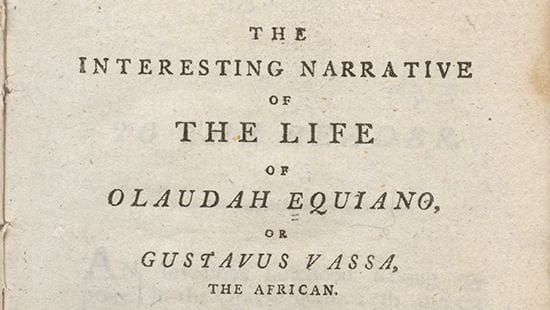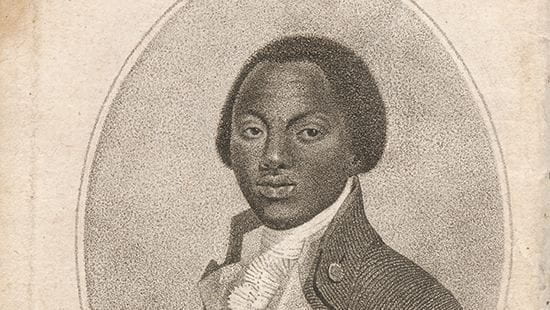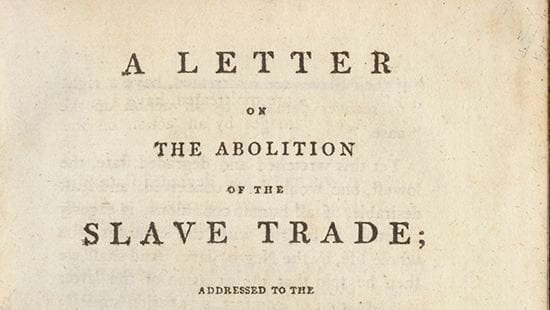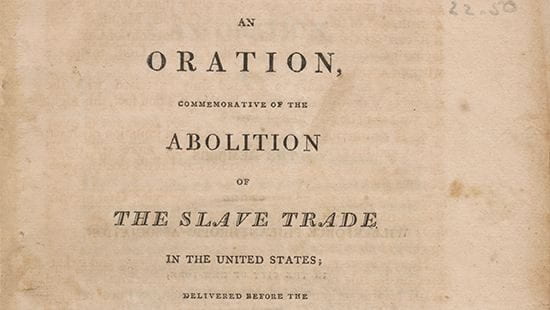Abolition
The abolitionist movement was an organized effort to end chattel slavery in the United States. However, abolitionist sentiments transversed throughout the Caribbean, South America, continental Europe and Africa. This section exhibits canonical anti-slavery texts, coupled with materials such as poems and letters from anti-slavery societies that fought to free millions of enslaved people from bondage.
Click images below to view full size documents.
The Interesting Narrative of the Life of Olaudah Equiano: or, Gustavus Vassa, the African
Olaudah Equiano, New York: W. Durell, 1791.
Equiano was born in the Kingdom of Benin around 1745. At 11 years old, he and his sister were kidnapped and sold into slavery. He was taken to the island of Barbados before coming to the colony of Virginia. After purchasing his freedom, Equiano settled in London and became involved in the abolitionist movement. In 1791, he published his autobiography, which historians consider the earliest slave narrative.
“I was now exceedingly miserable, and thought myself worse off than any of the rest of my companions; for they could talk to each other, but I had no person to speak to that I could understand. In this state I was constantly grieving and pining, and wishing for death, rather than anything else.”
—Olaudah Equiano, 1791
William Wilberforce and Granville Sharp
James Montgomery, The Abolition of the Slave Trade. London: R. Bowyer, 1814.

 The end of the slave trade in the British Empire and the United States were two highly notable moments among abolitionists, although this did not abolish slavery. However, abolitionists in both the United States and the British Empire celebrated the prospects of a monumental achievement. Montgomery’s poem captures that sentiment. Pictured above are William Wilberforce and Granville Sharpe, two prominent campaigners against Britain’s involvement in the slave trade.
The end of the slave trade in the British Empire and the United States were two highly notable moments among abolitionists, although this did not abolish slavery. However, abolitionists in both the United States and the British Empire celebrated the prospects of a monumental achievement. Montgomery’s poem captures that sentiment. Pictured above are William Wilberforce and Granville Sharpe, two prominent campaigners against Britain’s involvement in the slave trade.
A Letter on the Abolition of the Slave Trade, Addressed to Freeholders and Other
Inhabitants of Yorkshire
William Wilberforce, London: T. Cadell [by L. Hansard], 1807.
William Wilberforce was a British politician and leader in England’s anti-slavery movement. For nearly 20 years, Wilberforce was an outspoken advocate for the abolition of the Transatlantic Slave Trade, particularly in the British Empire. In 1807, the British parliament passed the Slave Trade Act of 1807, vowing to no longer transport African captives to any locale within the British Empire. The United States did the same in 1808.
“How surely does a demand for any commodities produce a supply. How certainly should we anticipate the multiplication of thefts, from any increase in number of the receivers of stolen goods. In the present instance, the demand is for men, women, and children. And, can we doubt that illicit methods will be resorted to for supplying them?”
—William Wilberforce, A Letter on the Abolition of the Slave Trade, 1807
An Oration, Commemorative of the Abolition of the Slave Trade in the United States; Delivered before the Wilberforce Philanthropic Association
Joseph Sidney, New York: J. Seymour, 1809.
Sidney celebrates the end of the slave trade in this pamphlet. He condemns Jeffersonian Republicans—an emerging American political party that advocated ideas of republicanism (the idea that freedom and equality were inalienable human rights) and political equality, yet kept men and women in bondage.
“Poem, Suggested by A. F. Baird’s Picture of a Slave Mart”
Princeton University, 1849.
S. Sanford’s poem was presented at the Twelfth National Anti-Slavery Bazaar in Faneuil Hall, Boston, convened from Dec. 23 to New Year’s Day. Estimated attendance was in the thousands, raising nearly $4,000 for the anti-slavery cause with contributions coming from Haiti, England, Scotland and Ireland.




More Information
This collection is housed in the Charles Deering McCormick Library of Special Collections and University Archives and the Melville J. Herskovits Library of African Studies of Northwestern University Libraries.




